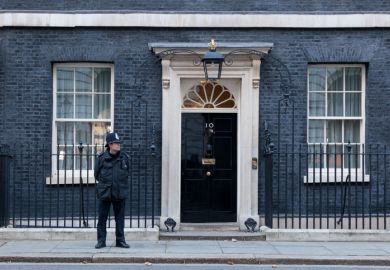A crescendo of attacks on universities from Conservatives, led by the prime minister, might not resonate with voters given support for degrees, according to new polling, while there are also suggestions that the tactic might be of “near-zero interest” to the public.
Rishi Sunak devoted a chunk of his speech at the recent Conservative Party conference – one of his best opportunities to communicate with the public ahead of a general election in 2024 – to calling the last Labour government’s policy of support for higher education expansion in England “one of the great mistakes of the last 30 years”, leading to “thousands of young people being ripped off”, as the science secretary and the education secretary also took aim at universities.
Mr Sunak did not mention the government’s “science superpower” aspirations for the UK. But he twice used a “no more rip-off degrees” line – referring to a previously announced plan to restrict student entry on courses falling below quality thresholds – and sought to play his government’s support for apprenticeships against university education, despite government backing for degree apprenticeships provided by universities.
Since the Brexit vote of 2016, the Conservative Party has shifted its focus towards Brexit-backing non-graduate voters, leading ministers and MPs to become increasingly critical of universities on both economic and cultural grounds. A prime minister’s speech arguing that one of the nation’s biggest problems is that too many people are in higher education confirms that the Conservatives are now mainlining that position.
Vivienne Stern, the Universities UK chief executive, said ministers must believe that attacking universities “is electorally popular. I think they are wrong about that.”
Jess Lister, associate director in the education practice at the political consultancy Public First, said that universities “remain popular, and that parents are still keen for their children to go to university”.
Public First polling of about 1,000 parents with children in state secondary schools, released during this week’s Labour Party conference, found that 31 per cent would want their child to gain a university degree – almost double the proportion who said they would want their child to get a degree apprenticeship (17 per cent).
Slightly higher levels of Conservative-voting parents wanted their children to gain a degree, compared with Labour-voting parents (31 per cent against 23 per cent).
Combined with recent polling for the international pro-democracy organisation More In Common showing that, in the UK, “60 per cent of adults trust universities – more than trust the police, the Bank of England and the BBC – it’s hard to see how attacking universities in this way is a vote winner”, said Ms Lister.
Tim Bale, professor of politics at Queen Mary University of London and author of The Conservative Party after Brexit: Turmoil and Transformation, said attacks on universities “might work as a small component part of an overall ‘war on woke’ strategy; but, in and of itself, what is or isn’t going on in universities is of near-zero interest even to those at whom the rhetoric is targeted – older non-graduates with culturally conservative values”.
Ms Stern said universities were “genuinely important to the health of the country and to the health of the economy. If you decide to pick that as a wedge issue, you risk doing real damage.”
She added that “my ambition now is to get [Mr Sunak] to acknowledge that the majority of this system is something to be proud of”, and that his and ministers’ concerns about quality are “focused on the very small minority of instances where things are not as they should be”.
“Government needs to be responsible in its rhetoric,” she continued.
Sir Chris Husbands, the Sheffield Hallam University vice-chancellor, said: “This is making policy by looking for dividing lines. There’s an air of unreality about this – you cannot remotely become a ‘science superpower’ without a highly effective research and teaching infrastructure; you cannot reform post-16 [education] without a long-term plan and an examination of the interdependencies.”
Register to continue
Why register?
- Registration is free and only takes a moment
- Once registered, you can read 3 articles a month
- Sign up for our newsletter
Subscribe
Or subscribe for unlimited access to:
- Unlimited access to news, views, insights & reviews
- Digital editions
- Digital access to THE’s university and college rankings analysis
Already registered or a current subscriber?








